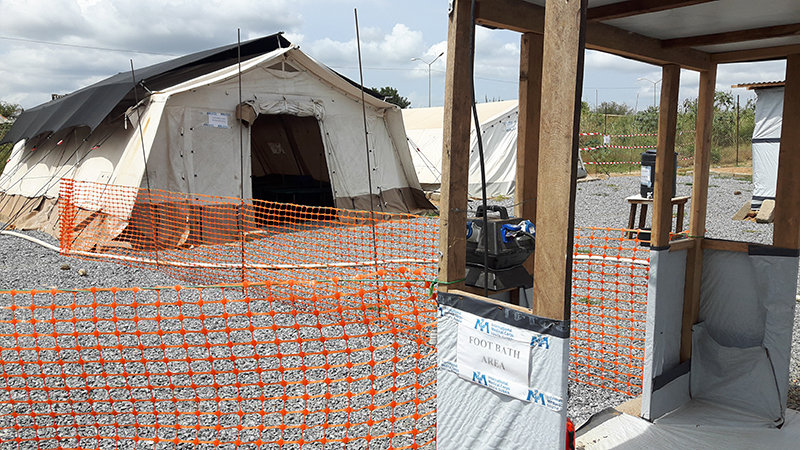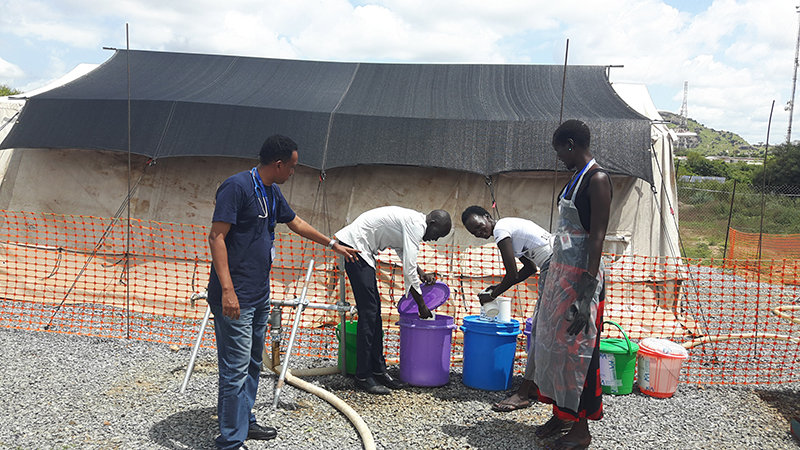By Lori Brister | Resource Development Officer
Every year, South Sudan’s rainy season intensifies what is already a dire humanitarian crisis. Stretching from May to October, the rains turn entire areas into swamps, making road access to many communities impossible. They also create fertile ground for disease—including cholera. This year was no different. As of October 20, there have been 2,539 reported cholera cases in South Sudan, with 39 resulting in death. Cholera is a bacterial infection caused by ingesting contaminated food or water. The infection causes acute diarrhea, which can lead to severe dehydration and, if untreated, death. Dr. Meroni Abraham, International Medical Corps’ Medical Coordinator in Juba, South Sudan, explained, "Cholera is treatable, but timely treatment is critical."
The majority of these cases have been in the capital, Juba, where International Medical Corps has been fighting cholera in the city’s largest displacement camps. These camps, or “protection of civilian” (POC) sites, host more than 37,000 people. Many of them have sought refuge there since South Sudan’s civil war first erupted in late 2013, but others poured into the UN Houses this July, after deadly fighting broke out in the capital between government and opposition forces. It was on the heels of this violence that the first cholera case was confirmed in the camp.
While this was not the first time International Medical Corps had responded to cholera in the camp, the aftermath of the July violence made the disease more difficult to prevent. "Sanitation in the camp deteriorated significantly and water supply was disrupted for a number of days, as the fighting prevented road traffic in and out of the camp," said Dr. Abraham. "This, combined with the onset of heavy rains, created a perfect storm for a cholera outbreak."
Dr. Abraham and his team were prepared. All clinical staff were trained on cholera case management and disease surveillance. Cholera bed, medicines, supplies, and testing kits were all prepositioned in the camp so that response could start immediately if it was needed. "It was because of this preparation that we were able to begin testing and treating people immediately," said Dr. Abraham.
In addition to being curable, cholera is also preventable, if people follow strict hygiene practices and have access to safe drinking water and sanitation services. It is because of this that Dr. Abraham and his team trained 70 community health workers to equip families with the knowledge they need to keep themselves safe from the disease and know the signs and symptoms and where to seek treatment. Dr. Abraham said, "The community health workers have gone house-to-house, talking with families about how cholera is spread. Stopping a cholera outbreak is as much about education as it is about timely treatment." In total, International Medical Corps treated 88 cholera patients in the Juba POCs since the first case on July 21. All of them survived. "Every case that we have treated in the cholera treatment unit or the cholera treatment center is a success story," Dr. Abraham said.
We thank the GlobalGiving community for your continued support as we work to treat and prevent cholera in South Sudan.
Project reports on GlobalGiving are posted directly to globalgiving.org by Project Leaders as they are completed, generally every 3-4 months. To protect the integrity of these documents, GlobalGiving does not alter them; therefore you may find some language or formatting issues.
If you donate to this project or have donated to this project, you can receive an email when this project posts a report. You can also subscribe for reports without donating.
Support this important cause by creating a personalized fundraising page.
Start a Fundraiser
